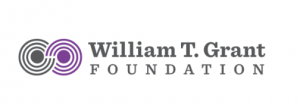William T. Grant Scholars Program

- Download the complete 2025 Application Guidelines
- Read “Bolstering our Commitment to the William T. Grant Scholars Program,” a note on the increase in funding from $350,000 to $425,000 for new awards
- Watch the most recent informational webinar, “William T. Grant Scholars: An Overview of the Program and How to Apply”
The William T. Grant Scholars Program supports career development for promising early-career researchers. The program funds five-year research and mentoring plans that significantly expand researchers’ expertise in new disciplines, methods, and content areas.
Applicants should have a track record of conducting high-quality research and an interest in pursuing a significant shift in their trajectories as researchers. We recognize that early-career researchers are rarely given incentives or support to take measured risks in their work, so this award includes a mentoring component, as well as a supportive academic community.
Awards are based on applicants’ potential to become influential researchers, as well as their plans to expand their expertise in new and significant ways. The application should make a cohesive argument for how the applicant will expand his or her expertise. The research plan should evolve in conjunction with the development of new expertise, and the mentoring plan should describe how the proposed mentors will support applicants in acquiring that expertise. Proposed research plans must address questions that are relevant to policy and practice in the Foundation’s focus areas.
Focus Areas
Reducing Inequality
In this focus area, we fund research studies that aim to build, test, or increase understanding of programs, policies, or practices to reduce inequality in the academic, social, behavioral, or economic outcomes of young people ages 5–25 in the United States, along dimensions of race, ethnicity, economic standing, sexual or gender minority status, language minority status, or immigrant origins.
Research Interests
Our research interests in this focus area center on studies that examine ways to reduce inequality in youth outcomes. We welcome descriptive studies that clarify mechanisms for reducing inequality or elucidate how or why a specific program, policy, or practice operates to reduce inequality. We also welcome intervention studies that examine attempts to reduce inequality. Finally, we welcome studies that improve the measurement of inequality in ways that can enhance the work of researchers, practitioners, or policymakers.
Recognizing that findings about programs and practices that reduce inequality will have limited societal impact until the structures that create inequality in the first place have been transformed, the Foundation is particularly interested in research to uproot systemic racism and the structural foundations of inequality that limit the life chances of young people
Improving the Use of Research Evidence
In this focus area, we support research on strategies focused on improving the use of research evidence in ways that benefit young people ages 5-25 in the United States. We want to know what it takes to get research used by decision-makers and what happens when research is used. We welcome letters of inquiry for studies that pursue one of these broad aims.
While an extensive body of knowledge provides a rich understanding of specific conditions that foster the use of research evidence, we lack robust, validated strategies for cultivating them. What is required to create structural and social conditions that support research use? What infrastructure is needed, and what will it look like? What supports and incentives foster research use? And, ultimately, how do youth outcomes fare when research evidence is used? This is where new research can make a difference.
Research Interests
Our research interests in this focus area center on studies that examine strategies to improve the use, usefulness, and impact of evidence in ways that benefit young people ages 5-25 in the United States. We welcome impact studies that test strategies for improving research use as well as whether improving research use leads to improved youth outcomes. We also welcome descriptive studies that reveal the strategies, mechanisms, or conditions for improving research use. Finally, we welcome measurement studies that explore how to construct and implement valid and reliable measures of research use.
Awards
Award recipients are designated as William T. Grant Scholars. Each year, four to six Scholars are selected.
Each Scholar receives exactly $425,000 over five years, including up to 7.5% indirect costs.
Awards begin July 1 of the award year and are made to the applicant’s institution. The award must not replace the institution’s current support of the applicant’s research.
Capacity Building
The Foundation holds annual meetings during the summer to support the Scholars’ career development. These summer retreats are designed to foster a supportive environment in which Scholars can improve their skills and work. Scholars discuss works-in-progress and receive constructive feedback on the challenges they face in conducting their projects. The retreat consists of workshops centered on Scholars’ projects, research design and methods issues, and professional development. The meeting is attended by Scholars, Scholars Selection Committee members, and Foundation staff and Board members. Scholars are also invited to attend other Foundation-sponsored workshops on topics relevant to their work, such as mixed methods, reducing inequality, and the use of research evidence in policy and practice.
In years one through three of their awards, Scholars may apply for additional awards to mentor junior researchers of color. The announcement and criteria for funding are distributed annually to Scholars. Our goals for the grant program are two-fold. First, we seek to strengthen the mentoring received by junior researchers of color and to position them for professional success. Second, we want to support William T. Grant Scholars and principal investigators in developing a stronger understanding of the career development issues facing their junior colleagues of color and to strengthen their mentoring relationships with them. In the longer term, we hope this grant program will increase the number of strong, well-networked researchers of color doing research on the Foundation’s interests and help foster more diverse, equitable, and inclusive academic environments.
Eligibility
Eligible Organizations
Grants are made to organizations, not individuals. Grants are limited, without exception, to tax-exempt organizations. A copy of the Internal Revenue Service tax-exempt status determination letter is required from each applying organization.
Eligible Applicants
Applicants must be nominated by their institutions. Major divisions (e.g., College of Arts and Sciences, Medical School) of an institution may nominate only one applicant each year. In addition to the eligibility criteria below, deans and directors of those divisions should refer to the Selection Criteria to aid them in choosing their nominees. Applicants of any discipline are eligible.
Applicants must have received their doctoral degree within seven years of submitting their application. We calculate this by adding seven years to the date the doctoral degree was conferred. In medicine, the seven-year maximum is dated from the completion of the first residency.
Applicants must be employed in career-ladder positions. For many applicants, this means holding a tenure-track position in a university. Applicants in other types of organizations should be in positions in which there is a pathway to advancement in a research career at the organization and the organization is fiscally responsible for the applicant’s position. The award may not be used as a post-doctoral fellowship.
Applicants outside the United States are eligible. As with U.S. applicants, they must pursue research that has compelling policy or practice implications for youth in the United States.
Selection Criteria
Applicant
- Applicant demonstrates potential to become an influential researcher. An ability to conduct and communicate creative, sophisticated research is proven through prior training and publications. Competitive applicants have a promising track record of first authored, high-quality empirical publications in peer-reviewed outlets. The quality of publications is more important than the quantity.
- Applicant will significantly expand his or her expertise through this award. The applicant should identify area(s) in which the award will appreciably expand his or her expertise, and specific details should be provided in the research and mentoring plans. Expansion of expertise can involve a different discipline, method, and/or content area than the applicants’ prior research and training.
Research Plan
- Research area is a strong fit with one of the Foundation’s current focus areas. Proposed research on reducing inequality should aim to build, test, and increase understanding of a program, policy, or practice to reduce inequality in the academic, social, behavioral, or economic outcomes of young people ages 5–25 in the United States. Proposed research on improving the use of research evidence should inform strategies to improve the use of research evidence in ways that benefit young people ages 5–25 in the United States.
- Proposals reflect a mastery of relevant theory and empirical findings, and clearly state the theoretical and empirical contributions they will make to the existing research base. Projects may focus on either generating or testing theory, depending on the state of knowledge about a topic.
- Although we do not expect that any one project will or should impact policy or practice, the findings should have relevance for policy or practice.
- Research plan reflects high standards of evidence and rigorous methods, commensurate with the proposal’s goals. The latter years or projects of the research plan may, by necessity, be described in less detail than those of the first few, but successful applicants provide enough specificity for reviewers to be assured of the rigor and feasibility of the plan:
- Research designs, methods, and analysis plans clearly fit the research questions under study.
- Discussions of case selection, sampling, and measurement include a compelling rationale that they are well-suited to address the research questions or hypotheses. For example, samples are appropriate in size and composition to answer the study’s questions. Qualitative case selection—whether critical, comparative, or otherwise—are appropriate to answer the proposed questions.
- The quantitative and/or qualitative analysis plan demonstrate awareness of the strengths and limits of the specific analytic techniques and how they will be applied in the current project.
- If proposing mixed methods, plans for integrating the methods and data are clear and compelling.
- Where relevant, there is attention to generalizability of findings and to statistical power to detect meaningful effects.
Research plan demonstrates adequate consideration of the gender, ethnic, and cultural appropriateness of concepts, methods, and measures.
- Research plan is feasible. The work can be successfully completed given the resources and time frame. Some research plans require additional funding, and in those cases, applicants have viable plans for acquiring that support.
- Research plan is cohesive and multiple studies (if proposed) are well-integrated.
- Research plan will significantly extend the applicant’s expertise in new and significant ways. Applicant provides specific details about how the research activities will stretch his or her expertise.
Application Review Process
First, Foundation staff screen abstracts, brief CVs, and, if warranted, full applications to determine whether they fit our research focus areas and potentially meet other Review Criteria. Next, the Scholars Selection Committee reviews the remaining applications. Each application receives detailed reviews by two Committee members.
The Committee then chooses approximately 10 finalists, who will be invited to New York City for an interview in February 2026. Prior to the interview, finalists’
proposals are reviewed by two external reviewers.
During the interview, finalists have the opportunity to respond to Committee
members’ and external experts’ reviews. Following the interviews, the Selection
Committee chooses four to six William T. Grant Scholars to recommend to the Board of Trustees for approval. Applicants will be notified of the Trustees’ decision by the end of March 2026.
